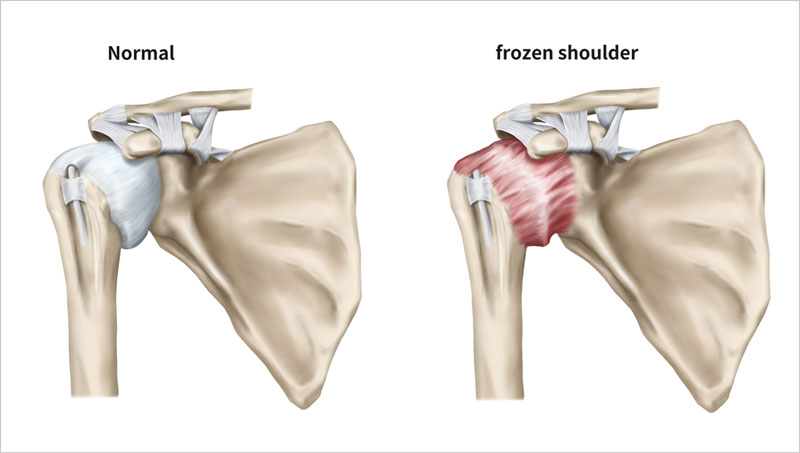Frozen Shoulder
What is frozen shoulder?
Frozen shoulder (adhesive capsulitis) involves a contraction of the glenohumeral joint capsule and adherence to the humeral head (“ball” portion of the shoulder’s ball and socket joint) leading to shoulder pain and loss of range of motion.

What are risk factors and/or causes of frozen shoulder?
Frozen shoulder is commonly idiopathic (i.e. no known cause); however, there are associations with concurrent shoulder pathology such as rotator cuff tendinopathy, subacromial impingement/bursitis, recent surgery, or inflammatory diseases. The other main risk factor is a history of diabetes mellitus.
How is frozen shoulder diagnosed?
Patients with shoulder arthritis typically present with diffuse and deep shoulder pain with progressive decrease in both active and passive range of motion. Physical examination may demonstrate limited and painful shoulder range of motion. X-ray, computed tomography (CT), or magnetic resonance imaging (MRI) may aid in confirmation of diagnosis.
How is frozen shoulder treated?
Initial treatment options for management of frozen shoulder may include medications and physical therapy. Physical therapy should primarily focus on pain control as well as multi-planar shoulder range of motion and maintenance of strength. If a patient is still experiencing significant pain and range of motion limitations despite the aforementioned treatment options, interventional options may include corticosteroid injections. Finally, referral to orthopedic surgeon for evaluation and possible manipulation under anesthesia may be considered.
Glenohumeral Joint Injection
Using x-ray (fluoroscopic) or ultrasound, a needle is carefully and precisely guided to the shoulder joint. Once the shoulder joint has been accessed, a steroid solution is instilled through the needle and into the joint capsule to coat or bathe the joint with anti-inflammatory medication. This helps to decrease inflammation and, subsequently, decreases pain and improves function.
At a Glance
Dr. Craig Best
- Harvard Fellowship-Trained Interventional Spine & Sports Medicine Specialist
- Double Board-Certified in Physical Medicnie & Rehabilitation and Pain Medicine
- Assistant Professor of Physical Medicine & Rehabilitation and Orthopedic Surgery
- Learn more

